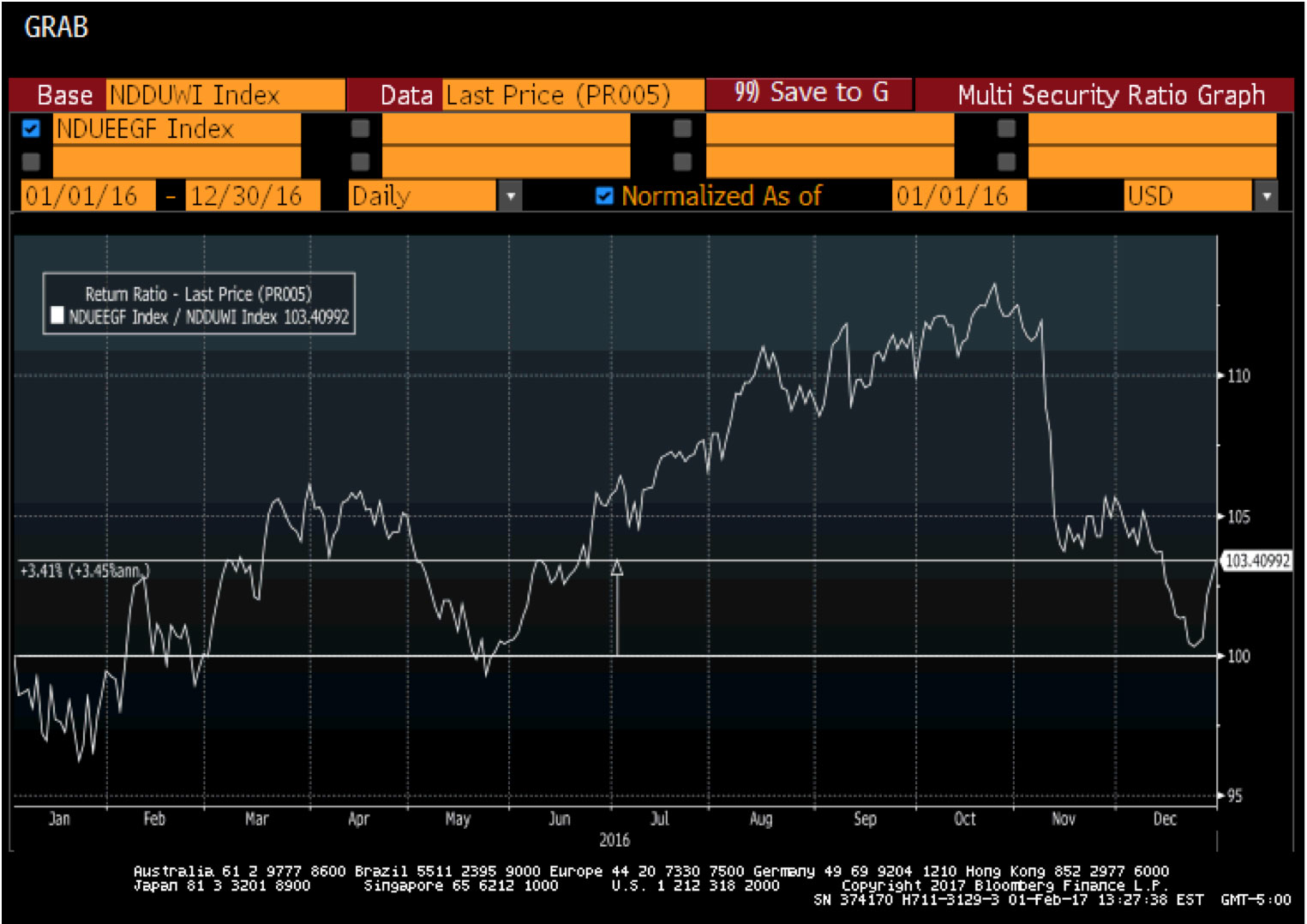Investors who view emerging market equities as chronic underperformers may be surprised to learn that in 2016, for the first time in several years, emerging markets outperformed their developed market counterparts. The MSCI Emerging Markets Index returned 11.6% in US dollar terms, while the MSCI World Index returned 8.2% (Exhibit 1). EM’s outperformance is all the more impressive considering the challenging environment faced by the asset class immediately following the US presidential election.
Exhibit 1: 2016 relative performance of the MSCI EM Index versus the MSCI World Index

Source: Bloomberg
Breaking down the relative performance, both earnings and valuation trends favored emerging markets. Forward 12-month earnings per share for the MSCI Emerging Markets Index rose 3.4% during the year, while PE ratio increased by 4.7% from 11.3x to 11.8x. By comparison, forward 12-month earnings per share for the MSCI World Index rose 2.4%, while PE rerated by 2.8% from 15.7x to 16.1x. Dividend yields were similar.
Several factors underpinned this overall picture, some of which have been discussed in prior pieces. Commodity prices appreciated from a depressed level, which supported earnings and currencies for commodity exporting countries, while economic rebalancing and reform efforts in several emerging markets progressed, aiding improvement at the macro level. And at the company level, improved discipline surrounding capital and operating expenditures in recent years generated leaner operations, which helped drive margin expansion amid an improving demand environment.
While factors like US trade and monetary policy remain risks, we are optimistic that many of the trends witnessed in emerging markets over the past year will persist. Furthermore, the structural case for emerging markets, built upon superior demographics, debt levels, and potential for productivity improvement, remains as strong as ever. Additionally, a still wide relative valuation discount for emerging markets versus developed markets will make emerging markets an increasingly attractive investment over the coming years.
This information is not intended to provide investment advice. Nothing herein should be construed as a solicitation, recommendation or an offer to buy, sell or hold any securities, market sectors, other investments or to adopt any investment strategy or strategies. You should assess your own investment needs based on your individual financial circumstances and investment objectives. This material is not intended to be relied upon as a forecast or research. The opinions expressed are those of Driehaus Capital Management LLC (“Driehaus”) as of January 2017 and are subject to change at any time due to changes in market or economic conditions. The information has not been updated since January 2017 and may not reflect recent market activity. The information and opinions contained in this material are derived from proprietary and non-proprietary sources deemed by Driehaus to be reliable and are not necessarily all inclusive. Driehaus does not guarantee the accuracy or completeness of this information. There is no guarantee that any forecasts made will come to pass. Reliance upon information in this material is at the sole discretion of the reader.
Other Commentaries
Driehaus Emerging Markets Small Cap Equity Strategy March 2024 Commentary With Attribution
By Chad Cleaver, CFA
Driehaus Emerging Markets Growth Strategy March 2024 Commentary with Attribution
By Howie Schwab